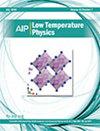一维电子流体的导热性
IF 0.8
4区 物理与天体物理
Q4 PHYSICS, APPLIED
引用次数: 0
摘要
结合动力学研究了一维电子流体的热导率[R]。萨曼塔,I. V. Protopopov, A. D. Mirlin和D. B. Gutman,一维电子流体的热输运,物理学。水利水电工程学报,2016,32 (1)[j]。李建军,李建军,李建军,李建军,一维电子流体的异常流体力学,物理学报。Rev. Lett. 126, 256801(2021)]理论。动力学方法是通过将希尔伯特空间划分为玻色子和费米子扇区来发展的。我们将重点放在长寿命热激发为费米子的区域,并计算热导率。从运动理论的角度来看,热导率的费米子部分是正常的,而玻色子部分是反常的,其尺度为ω-1/3,因此在红外极限中占主导地位。将费米子动力学方程投影到碰撞积分的零模上,得到了多模流体力学理论。两种理论在一定程度上是一致的,流体力学理论计算的热导率与动力学方程的结果相吻合。水动力模态之间的相互作用导致重整化,从而导致输运系数的异常标度。在四模态中,所有模态都是弹道的,并且异常表现为具有不对称幂律尾的卡尔达-帕里西-张式展宽。脉冲的“头”和“尾”对导热性的贡献相同,导致导热性的ω-1/3标度。在三模态下,系统属于经典粘性流体的普适类[Herbert Spohn,非线性波动流体动力学for anharmonic chains, J. Stat. physics . 154, 1191 (2014);张志刚,一维动量守恒系统中的异常热传导,物理学报。[j].科学通报,2002(2)。本文章由计算机程序翻译,如有差异,请以英文原文为准。
Thermal conductivity in one-dimensional electronic fluids
We study thermal conductivity in one-dimensional electronic fluids combining kinetic [R. Samanta, I. V. Protopopov, A. D. Mirlin, and D. B. Gutman, Thermal transport in one-dimensional electronic fluid, Phys. Rev. Lett. 122, 206801 (2019)] and hydrodynamic [I. V. Protopopov, R. Samanta, A. D. Mirlin, and D. B. Gutman, Anomalous hydrodynamics in one-dimensional electronic fluid, Phys. Rev. Lett. 126, 256801 (2021)] theories. The kinetic approach is developed by partitioning the Hilbert space into bosonic and fermionic sectors. We focus on the regime where the long-living thermal excitations are fermions and compute thermal conductivity. From the kinetic theory standpoint, the fermionic part of thermal conductivity is normal, while the bosonic one is anomalous, that scales as ω–1/3 and thus dominates in the infrared limit. The multi-mode hydrodynamic theory is obtained by projecting the fermionic kinetic equation on the zero modes of its collision integral. On a bare level, both theories agree and the thermal conductivity computed in hydrodynamic theory matches the result of the kinetic equation. The interaction between hydrodynamic modes leads to renormalization and consequently to anomalous scaling of the transport coefficients. In a four-mode regime, all modes are ballistic and the anomaly manifests itself in Kardar-Parisi-Zhang-like broadening with asymmetric power-law tails. “Heads” and “tails” of the pulses contribute equally to thermal conductivity, leading to ω–1/3 scaling of heat conductivity. In the three-mode regime, the system is in the universality class of a classical viscous fluid [Herbert Spohn, Nonlinear fluctuating hydrodynamics for anharmonic chains, J. Stat. Phys. 154, 1191 (2014); O. Narayan and S. Ramaswamy, Anomalous heat conduction in one-dimensional momentum-conserving systems, Phys. Rev. Lett. 89, 200601 (2002)].
求助全文
通过发布文献求助,成功后即可免费获取论文全文。
去求助
来源期刊

Low Temperature Physics
物理-物理:应用
CiteScore
1.20
自引率
25.00%
发文量
138
审稿时长
3 months
期刊介绍:
Guided by an international editorial board, Low Temperature Physics (LTP) communicates the results of important experimental and theoretical studies conducted at low temperatures. LTP offers key work in such areas as superconductivity, magnetism, lattice dynamics, quantum liquids and crystals, cryocrystals, low-dimensional and disordered systems, electronic properties of normal metals and alloys, and critical phenomena. The journal publishes original articles on new experimental and theoretical results as well as review articles, brief communications, memoirs, and biographies.
Low Temperature Physics, a translation of the copyrighted Journal FIZIKA NIZKIKH TEMPERATUR, is a monthly journal containing English reports of current research in the field of the low temperature physics. The translation began with the 1975 issues. One volume is published annually beginning with the January issues.
 求助内容:
求助内容: 应助结果提醒方式:
应助结果提醒方式:


